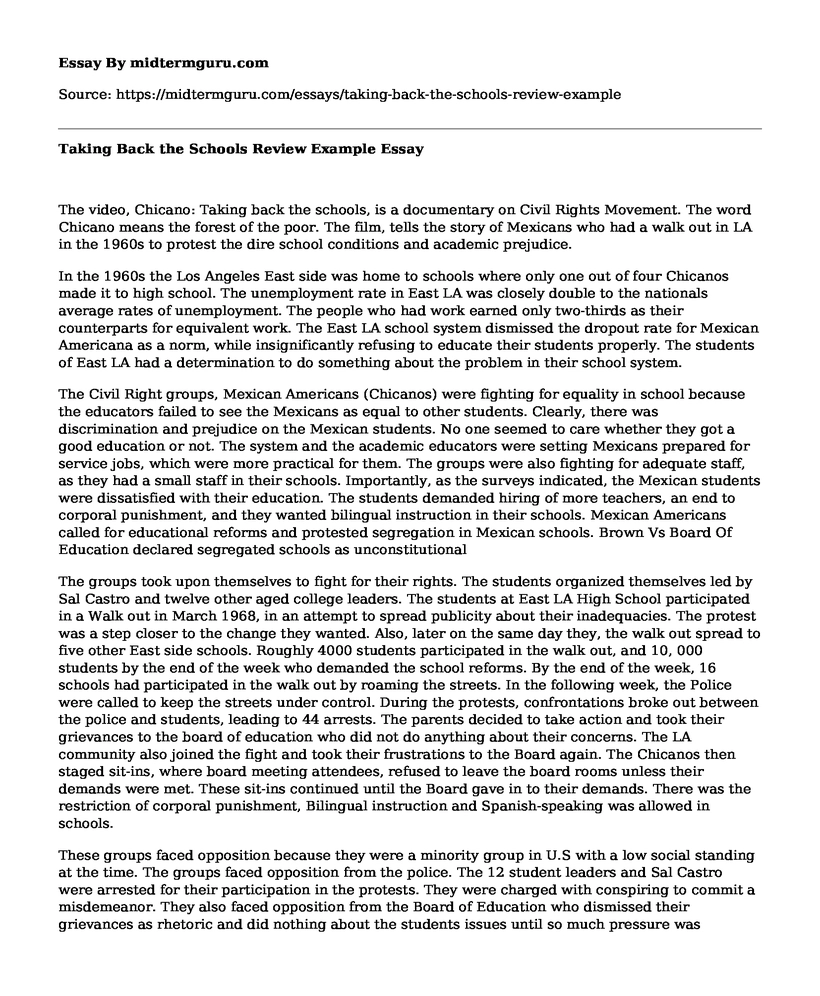The video, Chicano: Taking back the schools, is a documentary on Civil Rights Movement. The word Chicano means the forest of the poor. The film, tells the story of Mexicans who had a walk out in LA in the 1960s to protest the dire school conditions and academic prejudice.
In the 1960s the Los Angeles East side was home to schools where only one out of four Chicanos made it to high school. The unemployment rate in East LA was closely double to the nationals average rates of unemployment. The people who had work earned only two-thirds as their counterparts for equivalent work. The East LA school system dismissed the dropout rate for Mexican Americana as a norm, while insignificantly refusing to educate their students properly. The students of East LA had a determination to do something about the problem in their school system.
The Civil Right groups, Mexican Americans (Chicanos) were fighting for equality in school because the educators failed to see the Mexicans as equal to other students. Clearly, there was discrimination and prejudice on the Mexican students. No one seemed to care whether they got a good education or not. The system and the academic educators were setting Mexicans prepared for service jobs, which were more practical for them. The groups were also fighting for adequate staff, as they had a small staff in their schools. Importantly, as the surveys indicated, the Mexican students were dissatisfied with their education. The students demanded hiring of more teachers, an end to corporal punishment, and they wanted bilingual instruction in their schools. Mexican Americans called for educational reforms and protested segregation in Mexican schools. Brown Vs Board Of Education declared segregated schools as unconstitutional
The groups took upon themselves to fight for their rights. The students organized themselves led by Sal Castro and twelve other aged college leaders. The students at East LA High School participated in a Walk out in March 1968, in an attempt to spread publicity about their inadequacies. The protest was a step closer to the change they wanted. Also, later on the same day they, the walk out spread to five other East side schools. Roughly 4000 students participated in the walk out, and 10, 000 students by the end of the week who demanded the school reforms. By the end of the week, 16 schools had participated in the walk out by roaming the streets. In the following week, the Police were called to keep the streets under control. During the protests, confrontations broke out between the police and students, leading to 44 arrests. The parents decided to take action and took their grievances to the board of education who did not do anything about their concerns. The LA community also joined the fight and took their frustrations to the Board again. The Chicanos then staged sit-ins, where board meeting attendees, refused to leave the board rooms unless their demands were met. These sit-ins continued until the Board gave in to their demands. There was the restriction of corporal punishment, Bilingual instruction and Spanish-speaking was allowed in schools.
These groups faced opposition because they were a minority group in U.S with a low social standing at the time. The groups faced opposition from the police. The 12 student leaders and Sal Castro were arrested for their participation in the protests. They were charged with conspiring to commit a misdemeanor. They also faced opposition from the Board of Education who dismissed their grievances as rhetoric and did nothing about the students issues until so much pressure was mounted on them. They also faced opposition from the society who labeled them as aggressors and subversive, just because they wanted a good education.
Cite this page
Taking Back the Schools Review Example. (2021, May 25). Retrieved from https://midtermguru.com/essays/taking-back-the-schools-review-example
If you are the original author of this essay and no longer wish to have it published on the midtermguru.com website, please click below to request its removal:
- How Hitlers Ideas Interacted With the Attitudes of Ordinary Germans
- Essay on the Whiskey Rebellion of 1794
- Soul by Soul Book Essay Example
- A Day to Remember - Essay Sample
- The Criteria of Just War and the Economics of Some Responses to Poverty
- The War in the Philippines: Sustaining American Politics Amidst Imperialism - Essay Sample
- The Great Depression: US's New Deal to Overcome Financial Hardships - Research Paper







